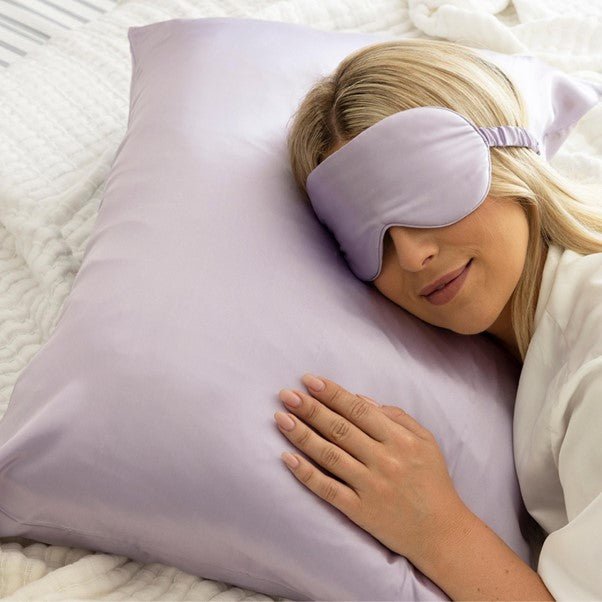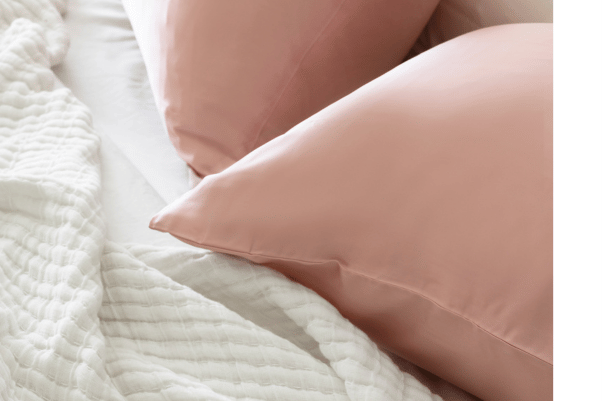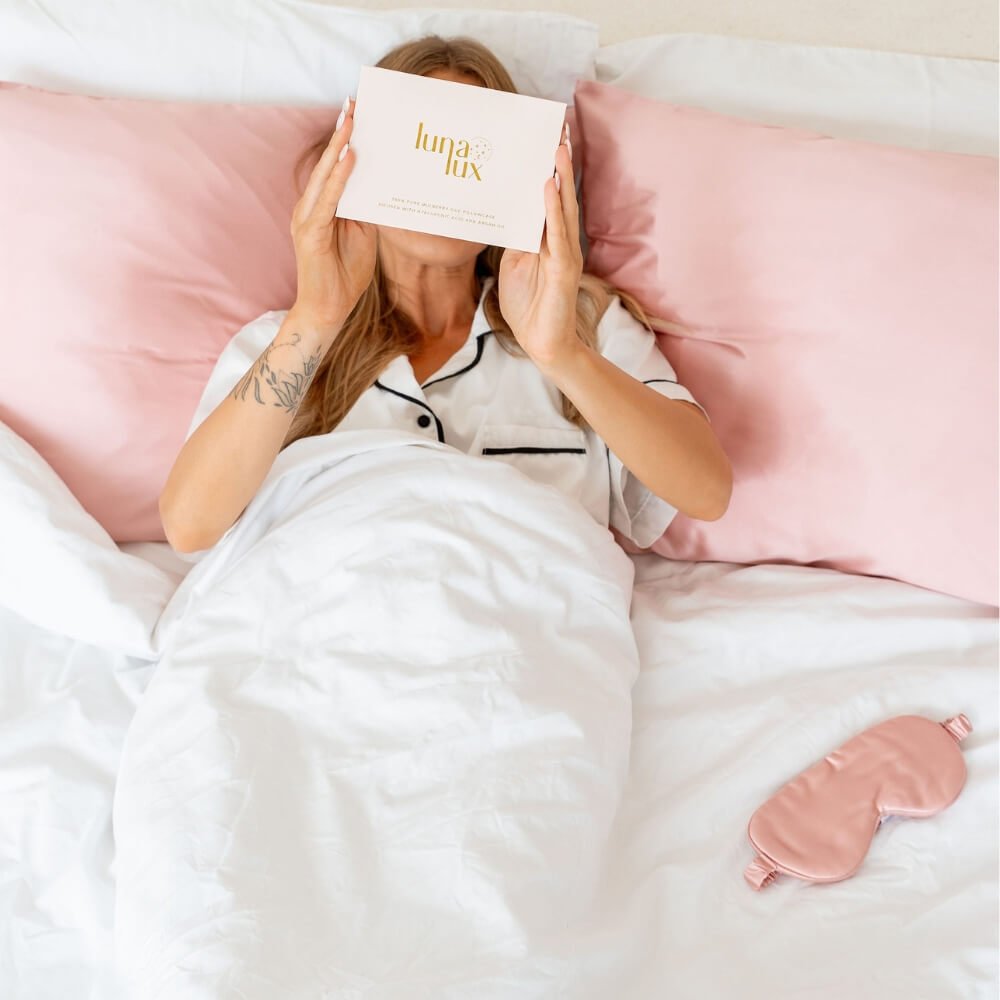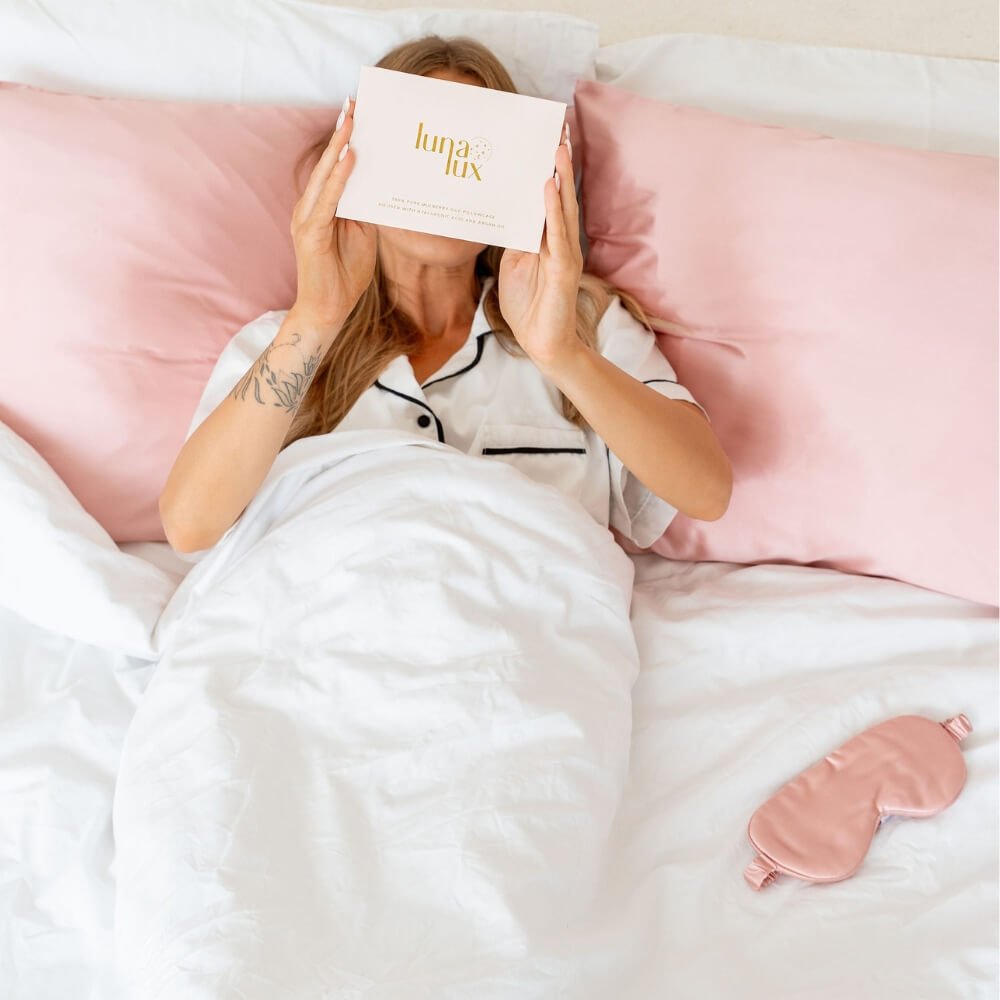A solid night’s sleep is essential for maintaining both your physical and mental well-being, however unfortunately the hustle and bustle of everyday life can make it tough for many to fall asleep or stay asleep.
If you’ve ever found yourself restless, unable to fall asleep or stay asleep despite your best attempts, it might be time to think about adding a sleep mask to your nightly routine.
There is much scientific research to back up the benefits of using a sleep mask, especially regarding blocking out ambient light for improved sleep. Thus Scientific advantages of using a sleep mask focus on the role of natural light, in affecting sleep quality, and why achieving total darkness is vital for your body’s natural sleep rhythm.
Thus, using a sleep mask can significantly enhance your sleep experience by blocking out unwanted light. Unwanted or ambient light is well known to interfere with melatonin production, the hormone that helps regulate your sleep cycle.
Thus whether you opt for a silk eye mask for a touch of luxury or a weighted eye mask for added comfort, the right choice can help you fall asleep faster and enjoy a more restful night.
By ensuring complete darkness, you not only improve your sleep quality but also support your circadian rhythm, leading to better overall health and well-being. So, if you’re looking to tackle sleep issues or simply want to enjoy some beauty sleep, consider giving a sleep mask a try.
What is a Sleep Mask?
A sleep mask is a simple, effective tool designed to block out light while you sleep. These masks typically cover both eyes and are made from various materials, such as silk, cotton, or memory foam, to ensure comfort.
They come in many shapes and designs to suit different preferences, but they all serve the same purpose: to help you sleep better by blocking out disruptive light sources. Some masks feature a double-layer design for extra light-blocking power, while others may include special features like cooling or heated elements for added comfort.
The key is finding a mask that fits well, feels comfortable, and effectively blocks external light sources like street lamps or electronic devices.
Why Are Sleep Masks So Beneficial?
Wearing a sleep mask offers more than just blocking light. Research has shown that sleep masks can promote REM sleep, which is essential for memory consolidation, cognitive function, and overall mental health.
By blocking light exposure, sleep masks help improve sleep quality and support your body’s circadian rhythm, which is the internal clock that regulates sleep-wake cycles. This is especially beneficial for those who struggle with sleep disorders or shift work.
Furthermore, sleeping in darkness helps the body produce melatonin, a natural hormone that induces sleep. This makes sleep masks ideal for creating the perfect environment for restful sleep, enabling you to fall asleep faster and enjoy a full night's rest.
Why We Need Effective Sleep
An effective night's rest is essential to maintain your overall physical and mental health. Sleep affects everything from immune function to cognitive performance. Poor sleep can lead to issues like memory problems, mood disorders, and increased skin irritation (like dark circles under the eyes). Consistently getting quality sleep helps the body recover, keeps your energy levels up, improves eye hydration, and boosts emotional resilience.
When we sleep well, our body heals and repairs itself throughout the night. However inadequate sleep disrupts the natural sleep cycle and can lead to long-term health issues, including sleep disorders and cognitive decline. Thus optimising your sleep environment, including using a sleep mask, is an important step in treating sleep problems and ensuring proper rest.
How Complete Darkness Improves Your Sleep
The importance of sleeping in complete darkness is often understated, as it is crucial for falling asleep and achieving proper sleep levels throughout the night.
Any exposure to light potentially interferes with the body’s ability to produce melatonin which is the hormone that regulates sleep patterns.
Especially artificial and ambient light from electronic devices, even though the light seems dim can suppress melatonin production. With a lack of melatonin, the body has a disrupted sleep and wake cycle. That leads to issues such as difficulty falling asleep, waking up during the night, and poor sleep quality.
According to scientific studies, even small amounts of dim light or ambient light can affect your sleep patterns, which reduces the quality of light and REM sleep patterns. This usually results in feeling groggy and fatigued the next morning, even after a full night's sleep.
On the other hand, complete darkness helps the body to sync with its natural circadian rhythms to ensure that you progress through the full sleep cycle, which includes the deeper and restorative stages of sleep. This in the end leads to better overall health and mental well-being. Proper sleep helps to reduce your risk of insulin resistance, it enhances memory consolidation and improves your mood.
Different Sleep Cycles
During the night, your body goes through different stages of sleep:
- Light Sleep - Where you are still slightly conscious and susceptible to waking up to any noise or disruptions.
- Deep Sleep - A deep and solid sleep stage where your body repairs and restores itself.
- REM Sleep - A sleep stage important for cognitive functions like learning, memory consolidation, and emotional regulation.
Light exposure can interfere with REM sleep especially, which is why sleeping in complete darkness is crucial. This is why a sleep mask can help you stay in deeper, more restorative sleep, ensuring that you wake up feeling refreshed and alert.
How Light Disturbs Sleep
Artificial light from sources like electronic devices, street lamps, or even the glow from an alarm clock can interfere with your sleep. Even low levels of light exposure can suppress melatonin production, disrupting your sleep-wake cycle.
Using a sleep mask is an effective way to block external light and help your body transition into deeper, restorative stages of sleep, promoting better overall health and improving the quality of your sleep.
Scientific Facts About Sleeping with a Sleep Mask
Scientific studies have supported the benefits of sleeping with a sleep mask. For example, one systematic review found that the scientific benefits of sleeping with a sleep eye mask in complete darkness significantly improved the subjective sleep quality of participants who wore eye masks. This is particularly important for people with sleep disorders, such as insomnia, as blocking out light can help them fall asleep faster and enjoy a deeper rest.
Research also shows that light exposure at night disrupts the body’s sleep cycle, particularly REM sleep, which is vital for learning and emotional regulation. By blocking light with a sleep mask, you can maintain a more stable sleep cycle, leading to deeper and more restorative sleep.
Additionally, weighted eye masks or silk masks can be soothing, helping reduce stress and promote relaxation before bed.
How to Choose the Best Sleep Mask
When selecting a sleep mask, it is important to consider the following factors:
- Fit and Comfort - Look for a mask with an adjustable strap to ensure a comfortable fit. This prevents the mask from slipping off during the night and avoids putting pressure on your eyes or head.
- Material - The fabric of the mask plays a crucial role in both comfort and effectiveness. Silk masks are soft and gentle on the delicate skin below, making them ideal for those with sensitive skin. Cooling eye masks are great for people who tend to overheat while sleeping, while memory foam masks offer a snug, comfortable fit.
- Light Blocking Capabilities - The best sleep masks have a thick, double-layer design to block out light completely. Masks with contoured shapes that don’t press against the eyes can further enhance your comfort and sleep quality.
- Durability and Washability - Choose a mask that is easy to clean, either machine washable or with a removable cover. This ensures the mask remains hygienic and lasts longer.
Conclusion: Sleep Masks for Better Sleep
In conclusion, sleep masks are a simple yet powerful tool for improving sleep quality. By blocking out ambient light and promoting complete darkness, sleep masks support your body’s natural circadian rhythm and help you achieve deeper, more restorative sleep.
Whether you choose a silk eye mask, a weighted eye mask, or a cooling eye mask, the key is finding one that fits comfortably and effectively blocks light.
If you're struggling with sleep issues, using a sleep mask can help you create a restful sleep routine. So, for a better sleep cycle, reduced skin irritation, and a refreshed feeling in the morning, consider adding a sleep mask to your nightly routine. Your body and mind will thank you for it!








